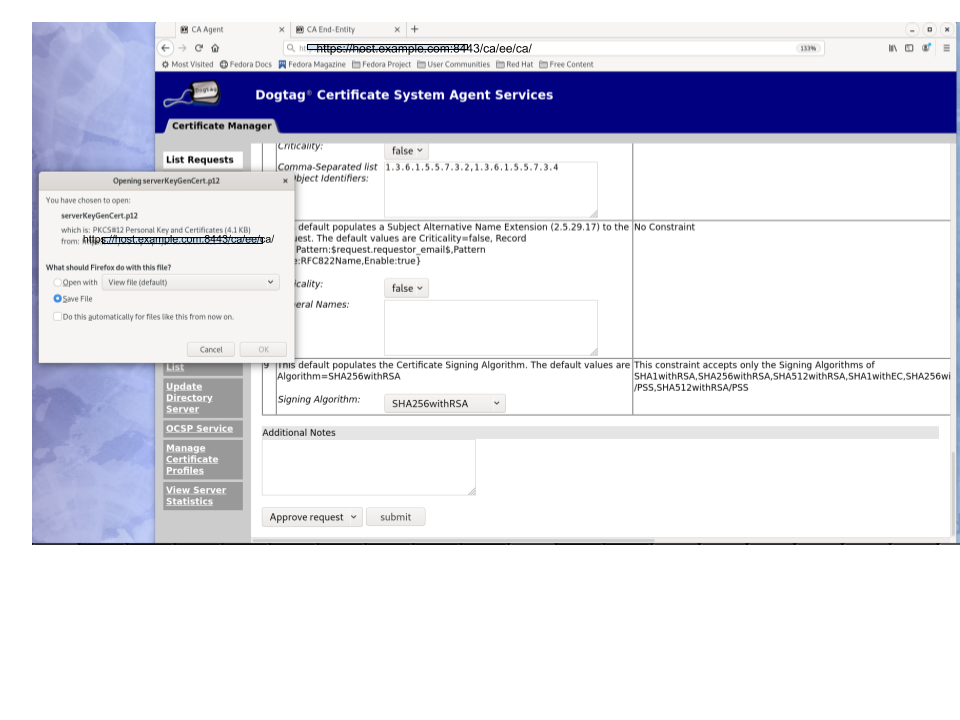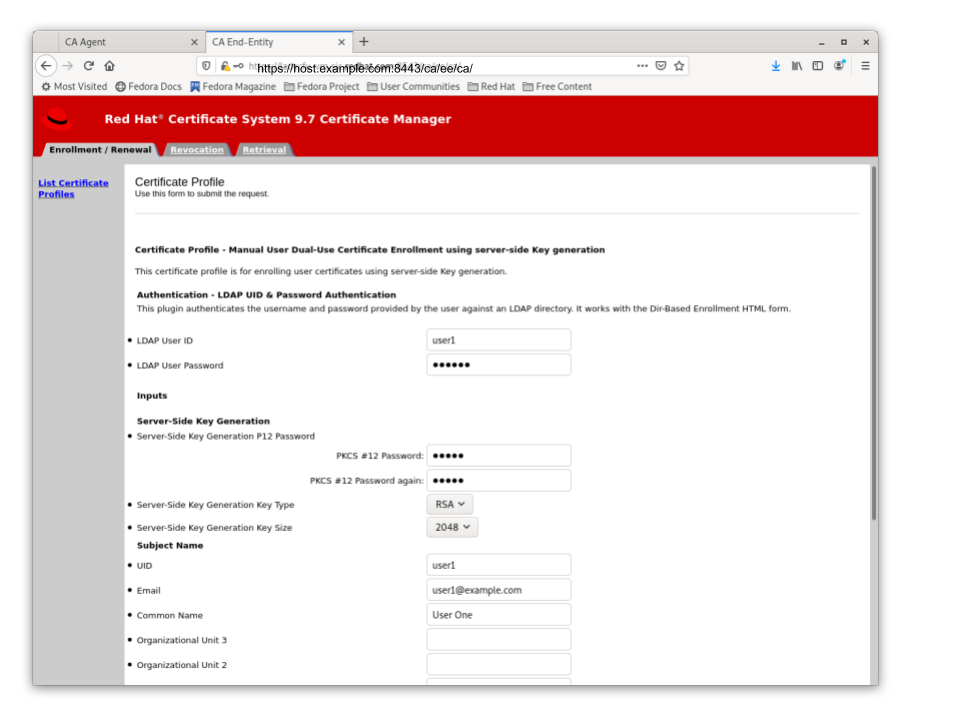-
Notifications
You must be signed in to change notification settings - Fork 148
PKI 10.9 ServerSide Keygen Enrollment for EE
Many newer versions of browsers, including Firefox v69 and up, as well as Chrome, have removed the functionality to generate PKI keys and the support for CRMF for key archival. While CLIs such as CRMFPopClient (see CRMFPopClient --help) or pki (see pki client-cert-request --help) could be used as a workaround on the Fedora or RHEL platforms, clients on the non-RedHat platforms have been largely left out.
Server-Side Keygen enrollment has been around for a long time since the introduction of Token Key Management System (TMS), where keys could be generated on KRA instead of locally on smart cards. In this release, we adopt a similar mechanism to resolve the browser keygen deficiency issue. Keys are generated on the server (KRA to be specific) and then transferred securely back to the client in PKCS#12.
Note: it is highly recommended that the Server-Side Keygen mechanism only being employed for encryption certificates.
-
Certificate request keys are generated on KRA (Note: KRA must be installed to work with the CA)
-
The profile default plugin,
serverKeygenUserKeyDefaultImpl, provides selection to enable or disable key archival (i.e. theenableArchivalparameter) -
Support for both RSA and EC keys
-
Support for both manual (agent) approval and automatic approval (e.g. directory password-based)
A KRA instance is required in addition to the CA for setting up Server-Side Keygen.
After installing CA and KRA instances, in the case of stand-alone Tomcat web server instances, you’d need to add the KRA’s transport cert to the CA’s nssdb.
-
Shut down CA
-
systemctl stop pki-tomcatd@instance_name.service
-
-
Export KRA’s transport certificate into a file
-
certutil -d /var/lib/pki/instance_name/kra/alias -L -n transport-cert-nickname -a > kra.cert
-
-
Import KRA’s transport cert into CA’s nssdb, using the nickname specified in CA’s
CS.cfg-
List the transport cert nickname:
-
grep "ca.connector.KRA.transportCertNickname" /var/lib/pki/instance_name/ca/conf/CS.cfg
-
-
Import using the nickname listed from above step:
-
certutil -d /var/lib/pki/instance_name/ca/alias -A -t “,,” -n transportNickName
-
-
-
Restart CA
-
systemctl restart pki-tomcatd@instance_name.service
-
Note: in the case when the CA and KRA are sharing a Tomcat instance, there is no need to execute the above step to import the transport certificate.
Two default profiles, and caServerKeygen_UserCert and caServerKeygen_DirUserCert.cfg, are provided by default to allow for certificate enrollments where keys are generated on the server side. However, any profile with the right input, output, and policy set could be turned into a server-side keygen profile
A Server-Side Keygen profile must contain the following components.
Key type and key size parameters can be configured as exemplified below:
policyset.userCertSet.3.constraint.class_id=keyConstraintImpl policyset.userCertSet.3.constraint.name=Key Constraint policyset.userCertSet.3.constraint.params.keyType=- policyset.userCertSet.3.constraint.params.keyParameters=1024,2048,3072,4096,nistp256,nistp384,nistp521 policyset.userCertSet.3.default.class_id=serverKeygenUserKeyDefaultImpl policyset.userCertSet.3.default.name=Server-Side Keygen Default policyset.userCertSet.3.default.params.keyType=RSA policyset.userCertSet.3.default.params.keySize=2048 policyset.userCertSet.3.default.params.enableArchival=true
The two default server-side keygen enrollment profiles different in the authentication mechanism, where
-
caServerKeygen_UserCert.cfg-
contains empty value to
auth.class_id=, meaning that enrollment requests through this profile will require approval from a CA agent.
-
-
caServerKeygen_DirUserCert.cfg-
contains
auth.instance_id=UserDirEnrollment, meaning that the user is required to pass LDAP uid/password authentication; Such authentication mechanism is considered as an automatic certificate issuance as it does not require per-request approval from a CA agent.
-
Automatic approval could be configured by setting the auth.instance_id directive to any compatible authentication plugin class, as examplified in the caServerKeygen_DirUserCert.cfg profile mentioned above. Here is an example of such configuration in CS.cfg:
auths.instance.UserDirEnrollment.dnpattern= auths.instance.UserDirEnrollment.ldap.basedn=ou=People,dc=example,dc=com auths.instance.UserDirEnrollment.ldap.ldapconn.host=host.example.com auths.instance.UserDirEnrollment.ldap.ldapconn.port=389 auths.instance.UserDirEnrollment.ldap.ldapconn.secureConn=false auths.instance.UserDirEnrollment.ldap.maxConns= auths.instance.UserDirEnrollment.ldap.minConns= auths.instance.UserDirEnrollment.ldapByteAttributes= auths.instance.UserDirEnrollment.ldapStringAttributes=mail auths.instance.UserDirEnrollment.pluginName=UidPwdDirAuth
The default Sever-Side Keygen enrollment profile can be found on the EE “List Certificate Profiles” as either of the following:
-
Manual User Dual-Use Certificate Enrollment using server-side Key generation
-
Directory-authenticated User Dual-Use Certificate Enrollment using server-side Key generation
The Server-Side Keygen Enrollment mechanism requires the End Entity user to enter a password for the PKCS12 package which will contain the issued certificate as well as the encrypted private key generated by the server once issued. The user is not supposed to share the password with anyone. Not even the CA or KRA agents.
When the enrollment request is approved, the PKCS12 package will be generated and,
-
In case of manual approval, the PKCS12 file will be returned to the CA agent that approves the request; The agent is then expected to forward the p12 file to the user.

-
In case of automatic approval, the PKCS12 file will be returned to the user who submitted the request

Once the PKCS#12 is received, the user could use CLI such as pkcs12util to import the p12 file into her/her own user internal cert/key database for each application. E.g. the user’s Firefox nss database.
Note: due to the nature of this mechanism, there are two KRA records:
-
One for request type "AsyncKeygenrequest"
-
This request type cannot be filtered at “List Requests” on KRA agent page; One could select “Show All Requests” to see them listed.
-
-
One for “recovery”
Some audit records could be observed if enabled:
-
SERVER_SIDE_KEYGEN_ENROLL_KEYGEN_REQUEST -
SERVER_SIDE_KEYGEN_ENROLL_KEYGEN_REQUEST_PROCESSED -
SERVER_SIDE_KEYGEN_ENROLL_KEY_RETRIEVAL_REQUEST -
SERVER_SIDE_KEYGEN_ENROLL_KEY_RETRIEVAL_REQUEST_PROCESSED
where SERVER_SIDE_KEYGEN_ENROLL_KEY_RETRIEVAL_REQUEST_PROCESSED is not yet added.
|
Tip
|
To find a page in the Wiki, enter the keywords in search field, press Enter, then click Wikis. |